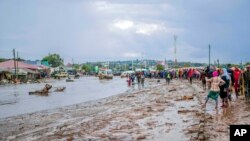Torrential downpours at the weekend washed away vehicles and brought down buildings in the hillside town of Katesh, 300 kilometers north of the capital Dodoma.
"Two more bodies were found in the ongoing search and now the death toll has reached 65," Prime Minister Kassim Majaliwa said.
Images broadcast on television showed debris from houses, including furniture, strewn across streets, with key roads, power lines and communication networks disrupted.
"From around five in the morning (on Sunday), I heard loud bangs outside the house. When we tried to escape, it was too late because mud, trees and stones were rolling from the mountain," said a man named James, who had lost his wife and daughter in the disaster.
Some 5,600 people have been displaced by the landslides, said Mobhare Matinyi, a government spokesman.
Rashid Ntandu, 24, lost his house in the disaster and found shelter in a school in Katesh which has been turned into a refuge center.
"I believe there are more bodies covered by mud," he said.
The disaster has prompted President Samia Suluhu Hassan to cut short her visit to Dubai for the COP28 climate talks, with her office saying she would visit the affected area on Thursday.
On Monday, Hassan said the death toll stood at 57 and those injured and receiving treatment were 85.
Zuhura Yunus, a spokesperson for her office, said the floods and landslides had affected 1,150 households, or 5,600 people, with 750 acres of farmland destroyed.
Severe flooding caused by the El Nino and Indian Ocean Dipole weather phenomena has forced hundreds of thousands from their homes in Kenya, Somalia, Ethiopia and Tanzania since the rains began.
The flooding comes on the back of the worst drought to hit the region in 40 years. Dry soils are less able to absorb water, increasing the risk of flash-flooding.
Scientists say climate change is causing more intense and more frequent extreme weather events.
In response, African leaders are pushing for new global taxes and changes to international financial institutions to help fund climate change action.
In neighboring Kenya, where floods have so far killed at least 154 people, the banks of the Voi River in the country's south burst on Monday, the Kenya Red Cross said.
Information for this article was sourced from Agence France-Presse and Reuters.

Forum